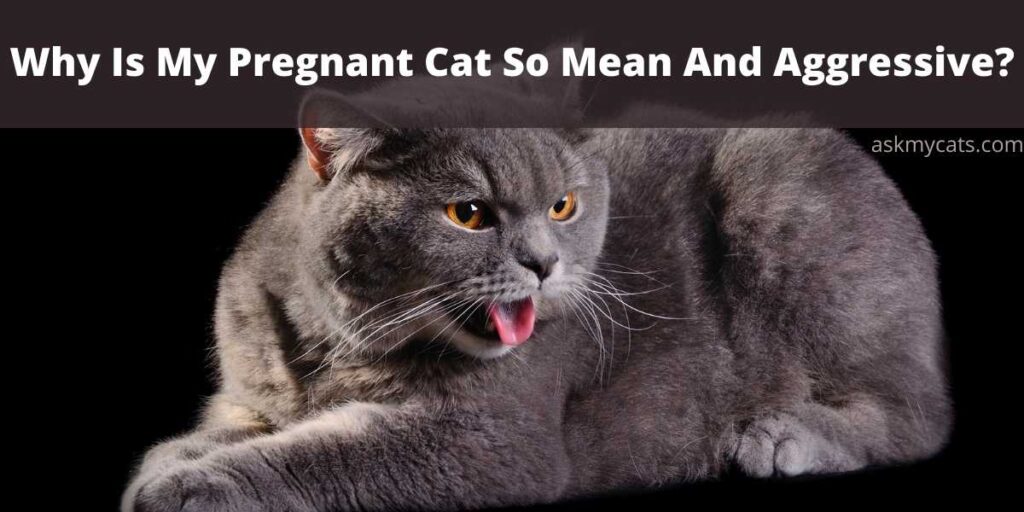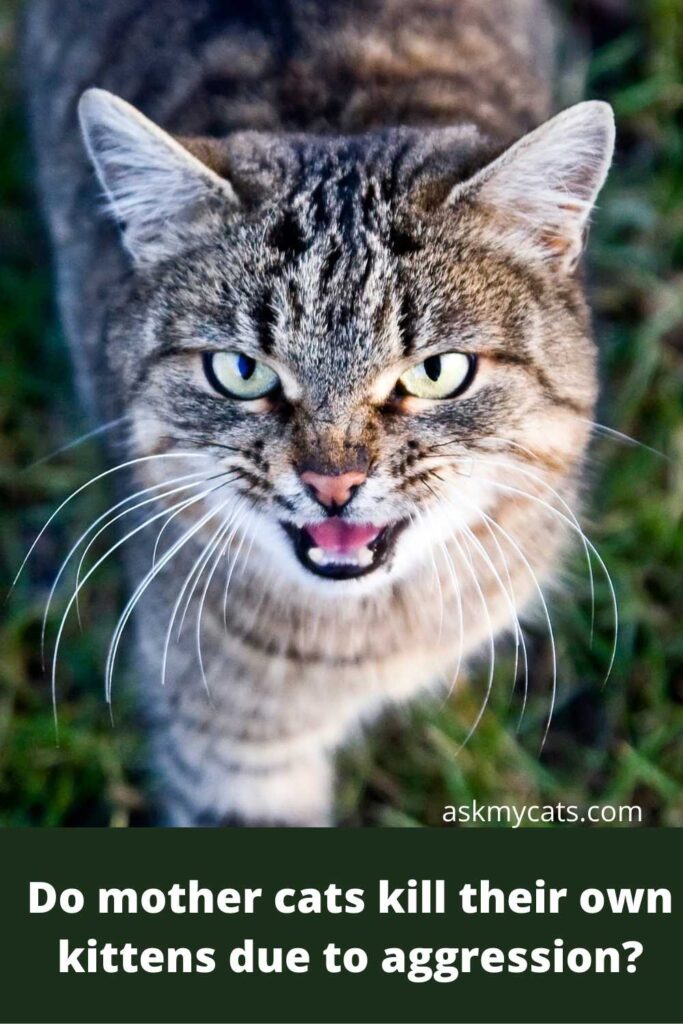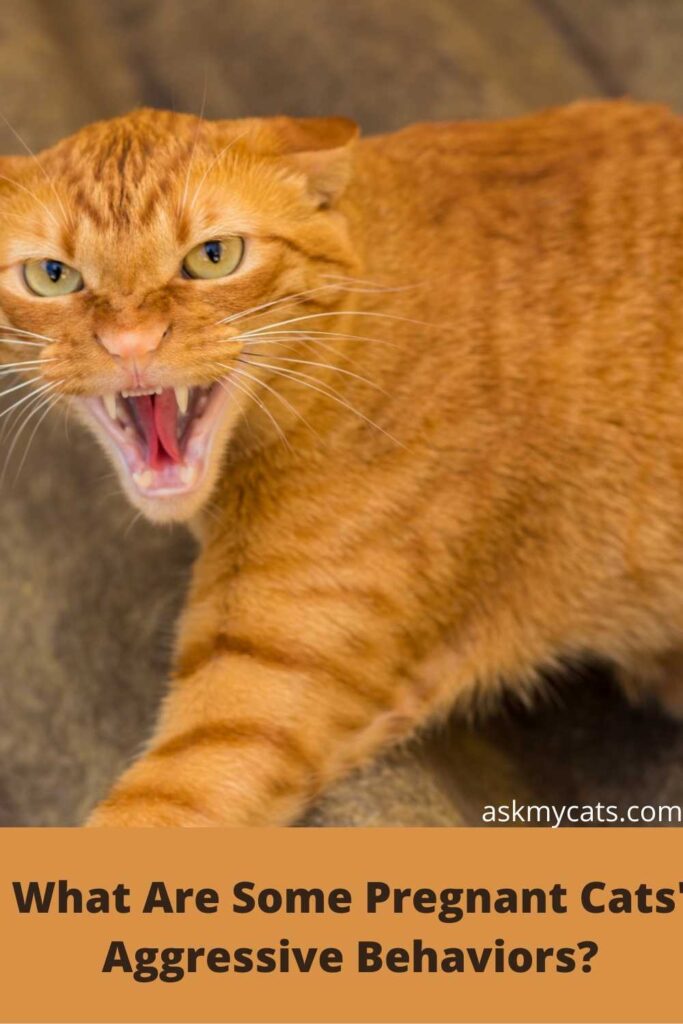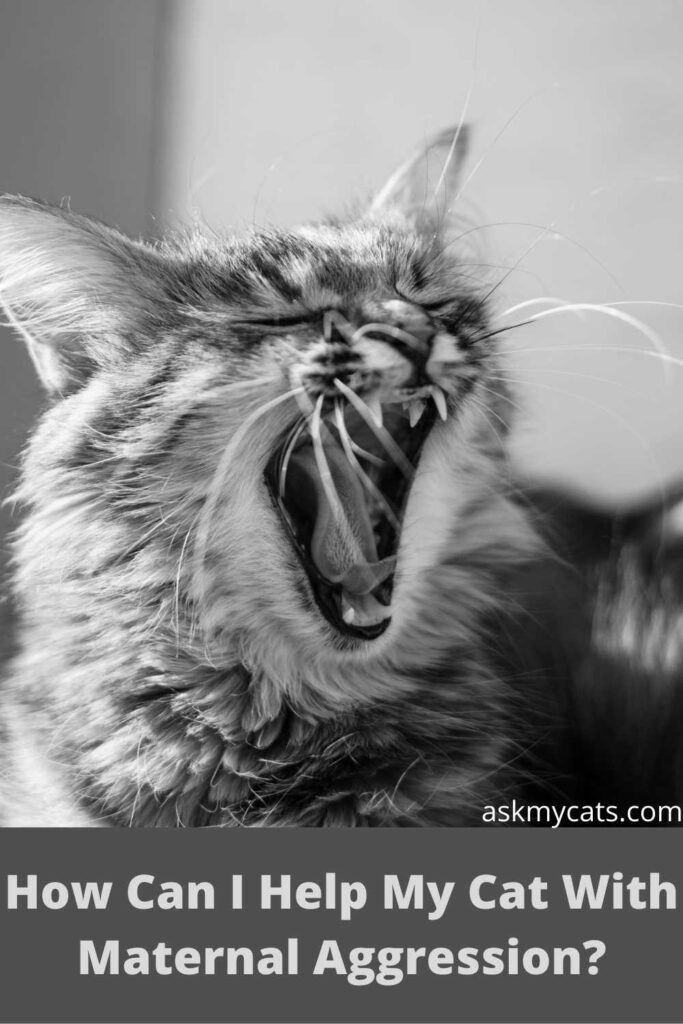Is your once-friendly fluffball acting all moody and unapproachable?
I can relate to you there.
When my baby cat, Oreo, was pregnant with her litter, she started to show “maternal aggression,” as explained by her vet.
Before I had firsthand experienced it I had numerous questions like why pregnant cats become aggressive and long their aggression last.
If you have similar doubts, don’t stop reading this article.


Give Your Cat the Perfect Day
Get the Free Ebook!
Do Pregnant Cats Become Aggressive?
A pregnant queen (or a mother cat) acting aggressively is known as maternal aggression.
When a queen and her new litter of kittens are in close proximity, she may become aggressive in order to protect them from people, other animals, or other cats.
Some of this protectiveness results from a mother’s love and care for her offspring. However, this reaction is triggered by both nature and changes in brain chemistry.
Her actions make sense because it’s in her natural instinct to protect her kittens. The hostility frequently decreases as the kittens mature and age.
What mother in her right mind wouldn’t go to great lengths to safeguard and defend her children, after all?
Can Cats Be Mean During Pregnancy?
Yes, some pregnant cats can have a bad attitude and become violent.
The queen may look for a suitable kittening bed or nest during the last week. The pregnant cat needs to be kept inside at this time. It’s critical that you keep a careful eye on your cat to spot any issues.
You should allow the mother cat to indulge in all of these behaviors since they are extremely natural. If she is interrupted, she could become even more mean and protective because she might perceive the interruption as a threat to her kittens.
Avoid self-diagnosing the mother cat’s issues if she is meowing unusually loudly or appears to be under a lot of stress. Instead, take her to the vet.
Do Mother Cats Kill Their Own Kittens Due To Aggression?

Yes, unfortunately, sometimes mother cats kill their own kittens. Although the reason may not be aggression, it can be because:
1. Insecurity About The Environment
There is little purpose in raising newborn kittens when there is a substantial possibility that the mother cat will be killed by something else, whether it be a dog or starvation.
If both the kittens’ and their mother’s lives were in danger, the feral mother cat wouldn’t want to have children.
If she had only had enough food to keep herself alive, she wouldn’t have had to kill her children because the offspring would be weak and starve.
The mother cat must consume at least 40% to 50% more food during nursing, further depleting her already limited resources.
2. Unhealthy Kittens
Even today, veterinarians don’t waste money on treating infants who have too many medical problems.
So it is far safer for the queen to abort severely deformed fetuses than to bring them to term and give birth, which is why many cats do it.
She will ultimately choose to murder them at birth because a cat cannot, of course, go off and get an ultrasound and decide to have an abortion.
Interesting Read: Why Do Mother Cats Attack Their Older Kittens?
Why Is My Pregnant Cat Angry?
The mama cat becomes angry due to the maternal hormones in her body. The same substances can undoubtedly affect how the cat behaves and responds.
The mother cat feels incredibly protective of her kittens and sometimes gets irritable. Every time a cat comes into contact with anything or someone strange, they automatically respond with a stranger danger alarm.
Introductions can ease the adjustment for any new cat entering a resident cat’s territory because new cats will naturally feel protective. Mother cats, however, also feel a sense of duty to defend both the territory around them and their young.
Any intruders are viewed as dangers to the kittens’ safety by their mother, who must create a secure environment for them.
Why Is My Pregnant Cat Hissing/Growling At Everything?
The anticipation of the birth of the children you and she are expecting causes your queen to become restless toward the end of her pregnancy.
You’ll notice her hissing and growling more often than usual as a result.
She will be searching for cozy, secret locations where she may slumber quietly. She is also looking for locations so she will know where to go after giving birth.
Take Note: There is a delicate line between excessive restlessness and irritation. Calling your veterinarian is a good idea if she seems overly agitated or restless, as she may be showing signs of eclampsia (a dangerous condition of pregnancy).
You might also like to read Why Is My Cat Growling After Giving Birth
What Are Some Pregnant Cats’ Aggressive Behaviors?
Here are some of the signs of “maternal aggression”:

- Attempting to feed or watch over inanimate objects that are kitten-sized
- Theft of kittens from a different mother cat
- Developing milk and swollen nipples
To train your queen to control her aggression, you can try the following things:
1. Be Understanding
Recent studies have revealed that specific genes regulate specific mothering behaviors in cats. Mother cats may lack the innate instinct required to nurse their litter in the absence or presence of a faulty mothering-linked gene.
Problems with parental conduct are often brought on by hormonal changes. Issues might also be brought on by stress. Additionally, behavior issues may be more common in first-time mama cats.
2. Take a Notice
Even if the two cats had previously been buddies, it is likely that the queen cat would act in a protective manner and make an effort to keep the other cats away from her young.
For the first several days of that time, stay away from the pregnant cat mom. Take her to the vet nevertheless, if you see that her anger is growing and she is becoming more vicious with each passing day.
3. Spoil Your Queen With Goodies
The queen cat needs to have her own food, drink, and litterbox if there are other cats living in the home.
She is able to maintain her solitude and stay away from any stressful kitties as a result. Aggression is less likely if any fear of sharing is reduced.
4. Accept Their Natural Instincts
A mother cat’s violent behavior is quite normal because it is part of her natural drive to defend her unborn young from many dangers.
Since cats are innately wild animals, it is common for them to instinctively guard their young. A habit that is overly prevented from developing could endanger their owners and harm them as a result.
Recognize their intentions, but if you notice something seriously problematic, go see a veterinarian.
How Long Does Maternal Aggression Last In Cats?
Once a queen gives birth, the maternal aggressiveness among expectant queens ends.
Occasionally, it takes a few days—that is, until the kittens start weaning. Alternately, the mother cat will occasionally hold off on ceasing her protective behavior until her kittens are older.
Mom cats behave aggressively because, unlike other mothers, they only care about their offspring and want to protect them from any potential harm.
When she is certain that her kittens are old enough to look out for themselves and take precautions when it comes to defense, she becomes passive.
How Can I Help My Cat With Maternal Aggression?

There are actions you can take to assist your cat with maternal aggression rather than viewing this as a notorious behavior. They are:
- Finding out if your cat has any maternal behavior issues would be the first step. The work of observation will be simple.
- Treatment for maternal behavior issues in cats can range from management to medication, depending on the severity of your cat’s behavior and the existence of underlying diseases.
- The most frequent type of treatment is management. This may entail keeping pregnant mother cats with aggression issues away from potentially harmful objects, animals, and other people.
- Given that spaying has been demonstrated to reduce this problem in the majority of animals, it may be advised for cats who exhibit excessive maternal behavior.
- If the condition is severe, your veterinarian may recommend hormone treatments to lessen or get rid of symptoms like nursing or uterine contractions.
Must Read: Why Is My Cat Biting Her Kittens?
Frequently Asked Questions
Why is my pregnant cat attacking her older kitten?
The older cat is seen as a threat to the unborn children by your pregnant queen, who is on high alert. Plan to spay your cat once she has given birth to her kittens.
If you are really consistent and play with and support the kitten so that he isn’t off bugging his mama, you might be able to make peace before the cats are settled, which may take three to four weeks.
Reintroduce the cats gradually after separating them.
Final Words
That was mostly what you needed to know about pregnant cats and their aggressive behavior.
Just remember that, unlike humans, cat moms do not always have a happy hormonal pregnancy. Being an animal from the wild, she instinctively does things that might concern you as a cat mom, but don’t worry.
This behavior soon subsides.
Let us know in the comment section if your furball ever acted angrily and aggressively during her pregnancy. Did you take her to the vet for a diagnosis? Or, did you let it subside by itself?
Interesting Read: Why Does My Cat Hiss At Strangers?

I have fostered many pregnant cats but the one I have now is the first one with maternal aggression and it’s not fun. She was very friendly when I first got her around 30 weeks pregnant but after a week she began to attack me whenever I went in her private room to feed her and change her litter box. She has not yet delivered and I now wear leather gloves and pants to protect myself but still pet and talk to her. I hope this aggression ends soon
Thank you for sharing your experience with fostering pregnant cats. Maternal aggression can definitely be a challenging behavior to deal with, especially when you’re trying to provide care for the cat. It sounds like you’re doing the right thing by taking precautions to protect yourself while still trying to maintain a relationship with her.
It’s important to remember that maternal aggression is a natural behavior for cats, and it’s their way of protecting their kittens. However, if the behavior persists after the kittens are born, it may be a sign of a deeper issue and should be addressed with a veterinarian or animal behaviorist.
In the meantime, continue to be patient and gentle with her, and avoid any sudden movements or loud noises that may trigger her aggression. Offering her treats or toys during your interactions may also help to build a positive association with your presence.
Thank you for being a dedicated foster parent for pregnant cats and for providing them with a safe and caring environment.
I’ve had my cat for 7 years going on 8, she is pregnant for the first time and recently started becoming aggressive. She viciously attacked me and I am definitely scared to get near her. Animal control helped me place her in a room where she’s being quarantined for the next 10 days. She’s the only cat in my home but there are many outside cats that I’ve been feeding the past couple days. I don’t know how to feed her or change her litter, I’m definitely terrified of going near her. She but and scratched me all over and drew blood, I went to get medical attention but I’m scared to even get near her let alone put in a pet carrier and take her to the vet. Is she going to attack me again after 10 days in quarantine ? I’m pretty sure kittens will be born within her 10 day quarantine period. Will she attack me when I open the door to see her and kittens? I love her to death and don’t want to cause her any harm or feel threatened by me. Will this aggression pass? I’m seriously traumatized 💔
Oh my goodness, I am so sorry to hear about your terrifying experience with your cat! It sounds like you must be feeling incredibly scared and overwhelmed right now. I can definitely understand why you would be hesitant to go near her again after being attacked like that.
Based on my experience, pregnant cats can sometimes become more aggressive due to hormonal changes in their bodies. However, it’s not uncommon for cats to display aggression for other reasons too, such as feeling threatened or stressed. In any case, it’s important to take steps to protect yourself and others around you from further harm.
Since you’ve already contacted animal control and they’ve placed her in quarantine, I would recommend reaching out to them again for advice on how to safely care for her during this time. They may be able to provide guidance on feeding her and changing her litter without putting yourself at risk.
As for whether or not she will attack you again once the quarantine period is over, it’s hard to say for sure. However, it’s possible that her aggression could be a temporary behavior due to her pregnancy or other factors. It might be a good idea to speak with a veterinarian or animal behaviorist to help determine the root cause of her behavior and develop a plan to help her overcome it.
In the meantime, please be sure to take care of yourself and seek medical attention if needed. Trauma from a cat attack can be both physical and emotional, so don’t hesitate to reach out for support if you need it. I hope that your cat and her kittens will be safe and healthy, and that you can find a solution that works for everyone involved.